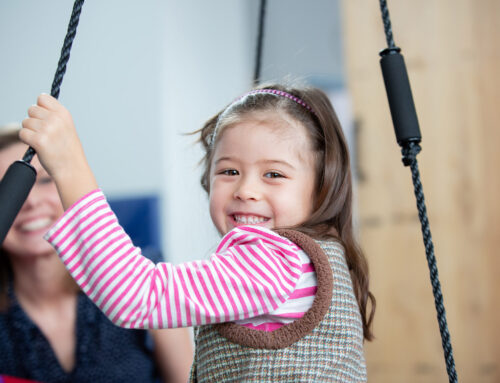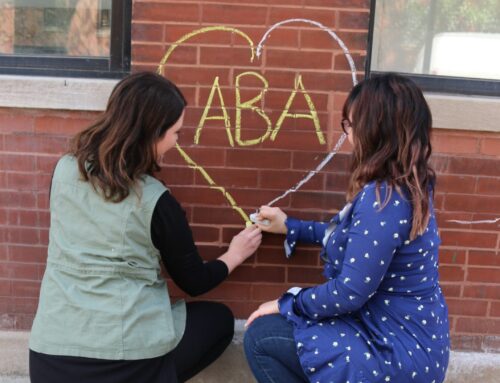The holiday season is here! Our behavior therapists put together a list of therapeutic gift ideas so the children in your life can learn as they play. These gift ideas are sorted into the following categories: Tactile/Sensory Play, Education Play, Cause and Effect Play, Imaginative Play, Social Play, and Daily Living Supports.
Tactile/Sensory Play
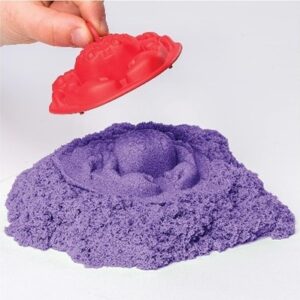
This toy is great for all types of learners! For younger children, this introduces new textures that they may eventually enjoy without having to go all the way to the beach. For more advanced learners, kinetic sand provides a clear setting for pretend play and is very manipulatable just like play doh.

What matches well with the kinetic sand is a sensory table! This can be filled with any sensory play materials that your loved one enjoys from slime to water to paper strips. This will help keep the sensory play contained and is easier to clean. Sensory bins inadvertently have the added benefit of providing a space that facilitates social play. Learners with their peers and caregivers can practice turn-taking with the sensory materials!
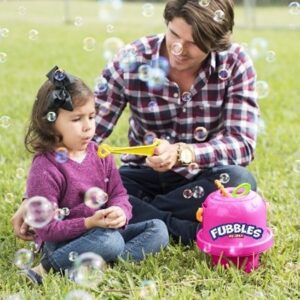
Fubbles offers a large bucket of bubbles with three wands for multiple people to able to play together. The best part though is that it can be knocked over and carried haphazardly due to its (almost) no-spill cap. Since there are multiple wands, this is a great opportunity to target social skills for our early learners!
Educational Play
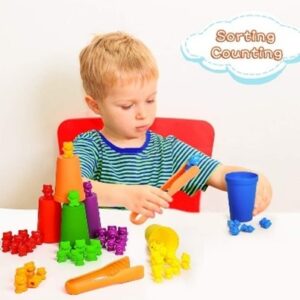
These colorful bears can be used in a multitude of ways to teach several foundational skills including sorting color and size. For more advanced learners, it provides something tangible to help visualize math concepts!

A great way to practice fine motor skills and learn the alphabet and numbers is make them into characters they can even include into pretend play! Alphabet robots require no assembly as your child can manipulate them from letters to robots and back. They even work as fidgets that learners can use to help sit at the table during mealtimes or bring to school.
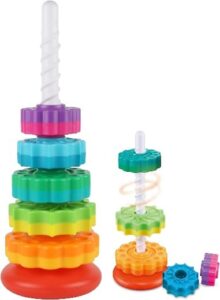
Best for early learners, this operates just like any other ring stacker but each piece spins as it descends the tower. It works on foundational skills like size and color discrimination. It makes this simple toy meant for learning more visually interesting. Even taking it apart and watching the pieces fall one-by-one is fun!
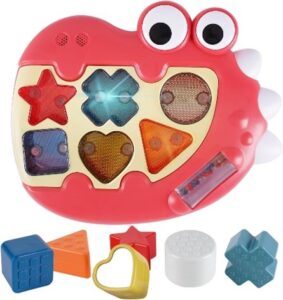
Shape identification is an important developmental skill for early learners and this toy offers multiple game modes for your loved one to keep practicing as they hone their skills!
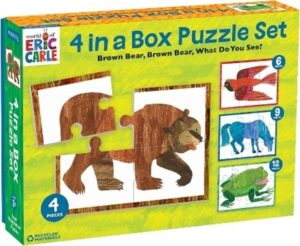
Puzzles allow multiple opportunities for problem solving, visual-perceptual awareness, and can even provide a space for social skills while doing puzzles with adults or peers. This pack of 4 puzzles offers different sets of scalable difficulty for your loved one.
Cause and Effect Play

With each button on this duck causing a different function, this is the epitome of a cause-and-effect toy. It’s an easy way for your loved one to learn how their interactions with objects can effect their environment. Your loved one can dance and watch as the duck trots around.
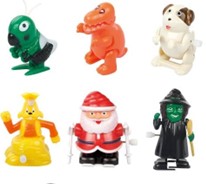
There are tons of fidgets that can be great stocking stuffers for your learners. Wind up toys are especially useful because it provides the same visual stimulation as the infamous fidget spinners while also being an opportunity for your learner to practice their fine-motor skills to use them. For early learners, they can practice self-advocacy if they need help getting these toys to function.
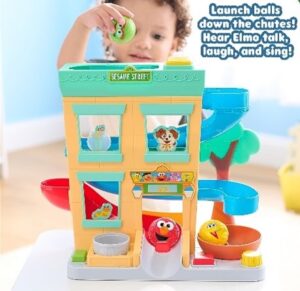
Ball drop towers are also great toys to teach foundational play skills that show how objects interact with each other. This sesame street ball tower has multiple functions for early learners to see a few favorite characters and learn relational play.
Imaginative Play

Regular building blocks are great toys to give to young learners to practice fine motor and visual perceptual skills. These magnetic blocks take it a step further so learners can build structures that defy gravity and increase the sensory stimulation with a satisfying ‘click’ as the blocks stick together. This set comes with a building guide booklet that is meant to test learners 2D to 3D visual perception and to spark ideas to how they can expand their building block play.
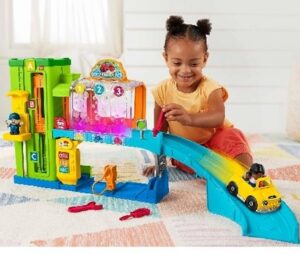
Imaginative and social play can be sparked with toys that have lots of manipulative parts that learners can cooperate with. Any situation where peers must use the same toys or must use a set of toys to complete a common goal allows many opportunities for social interactions.
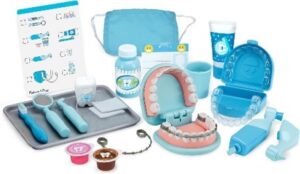
Sometimes, trips to the dentist can be scary. Pretend play is a great way to introduce potentially nerve-wracking situations and talk about what your child can expect during a dentist appointment. Learners can be told ahead of time what types of things they can do if they get nervous.
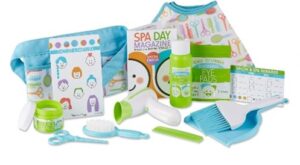
Whether your loved one is getting haircuts done in a salon or at home, the sights, sounds, and smells can be overwhelming especially for those who have big sensory sensitivities. What we can do is introduce play through pretend play. Young learners can practice the motions of getting a haircut by becoming the barber themselves.
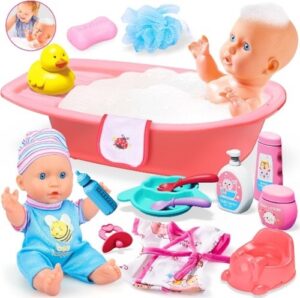
Even bath time can be a lot to handle for some sensorily sensitive people because of strong scents and different tactile sensations. Just like the dentist kit and hair salon, it’s helpful to be able to model what bath time looks like and to talk through the multi-step process of bathing so that young learners can know what to expect when the time actually comes.
Social Play
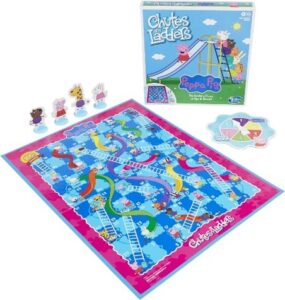
Chutes and Ladders has always been a foundational game that has been a part of many of our own childhoods. Much of the reason why is because board games are great ways to practice turn-taking and other social skills for early learners! Board games are also a way to introduce structured tasks without it having to feel like work.
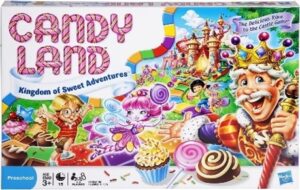
Board games are also a great way to teach following a set of rules in a closed environment with low stakes so your loved one may be able to generalize these skills in other environments. Candy land is great because its simplicity but has multiple opportunities for young learners to practice what to do when they’re penalized and how to deal with outcomes that they don’t necessarily enjoy.
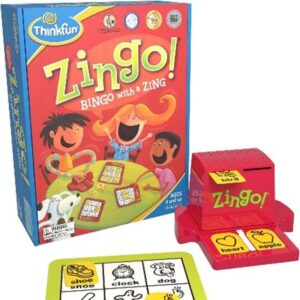
This game is a twist on the classic, Bingo, for young learners! While your loved one is practicing taking turns with older family members or peers in a playdate, they can also learn foundational academic skills. It has versions that cover topics ranging from math to reading at multiple levels so that they can continue playing even as they progress their skills.
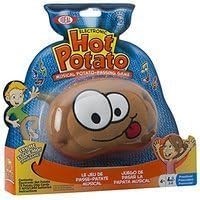
Hot potato is a fast–paced game dependent on social interactions between peers. Your loved one can play with family or friends as well as repeatedly practice what to do whether they win or lose the game.
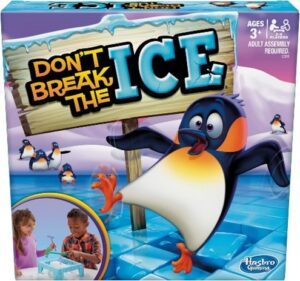
For more advanced learners, a game like Don’t Break the Ice makes them both work together on a common goal of putting the game together. Then, they must also take turns while working against each other. In every step, they have opportunities to practice social skills.
Daily Living Supports

Your young learner can take ownership of their stuff with this fun backpack. Plus, its covered in fasteners that they will interact with all the time in their daily life. They can learn to do and undo buckles, buttons, and shoelaces wherever they go.
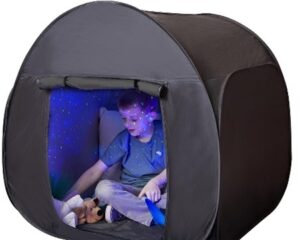
Our neurodivergent loved ones may get easily overwhelmed by the sights, sounds, and events of the world around them. Even stimuli that neurotypical people find usual may be tough to deal with sometimes. This blackout sensory tent provides them with a personal break space that they can make their own with stimuli they enjoy and can control. They can keep their favorite pillows, blankets, lights, and music players in the tent.

Whether your loved one likes bright lights or softer ones, give them the option to choose with a cute silicone nightlight. It is important for them to be able to change the lights according to their needs in the moment. It’s a simple and subtle way to empower them to support their autonomy.
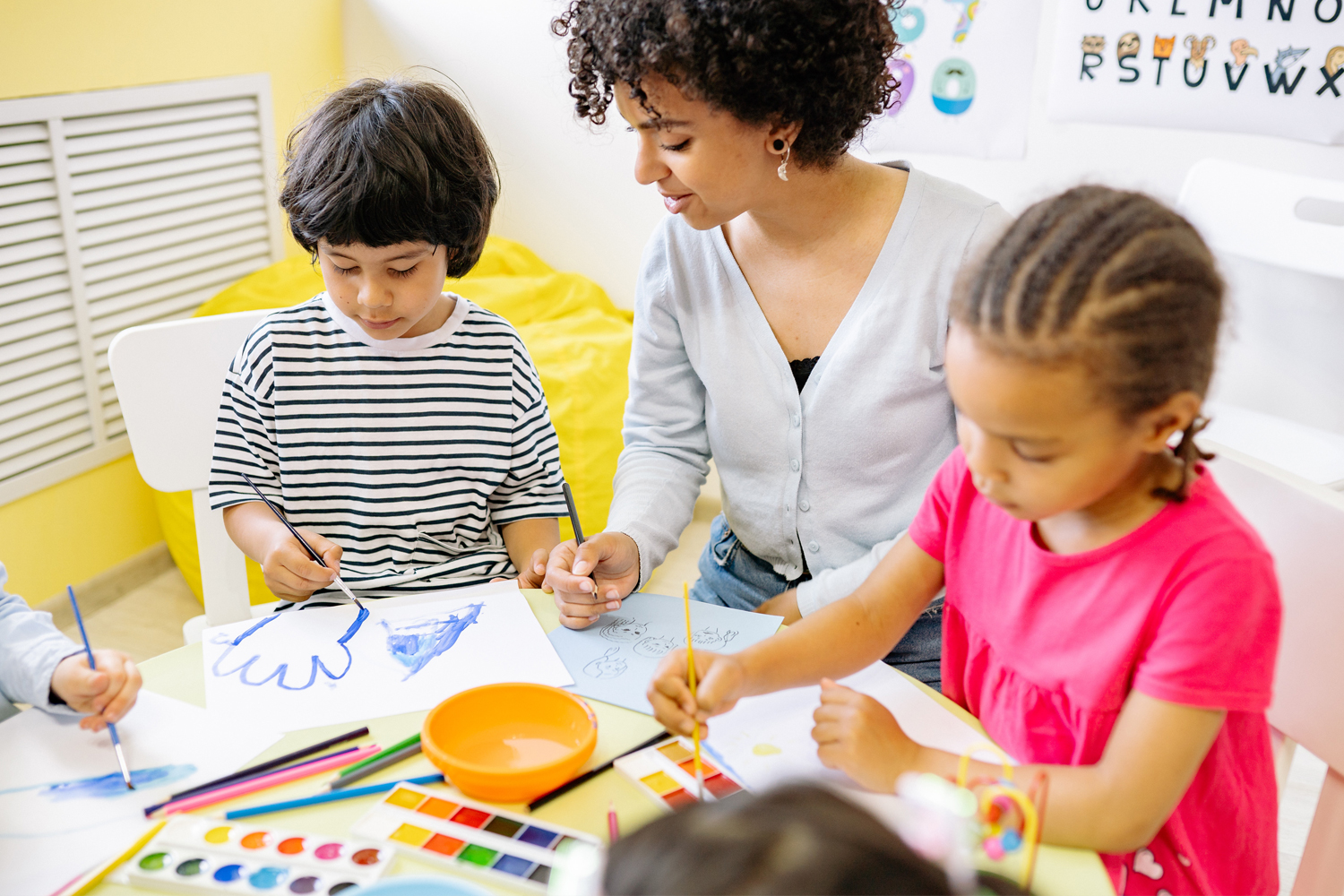
Blue Bird Day fosters socialization, sensory regulation, and pre-academic learning in children ages 2-7 years in therapeutic rotations that simulate preschool and kindergarten settings. Our compassionate therapists practice a relationship-based and family-centered approach, provide parent training, and collaborate on goals and individualized intensive treatment plans for your child.
We believe in a collaborative and multi-disciplinary team approach to therapy. A team of occupational therapists, speech-language pathologists, dietitians, developmental therapists, behavioral therapists, physical therapists, and therapeutic assistants are created for each child to ensure child and family are fully supported and the best possible results are achieved.
Options for individualized, group and virtual therapy sessions are available as well.
Want to learn more or you have a specific question? Feel free to connect with us here!

